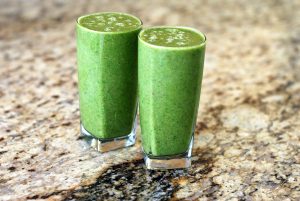Long before vitamins were identified as essential to good health, people recognized that food had the power to cure. The ancient Egyptians knew that feeding a patient liver would help cure night blindness, an illness that is caused by a vitamin A deficiency. In 1749, the Scottish surgeon James Lind discovered that citrus foods helped prevent scurvy among sailors. Scurvy causes poor wound healing, bleeding of the gums, severe pain, and death. But sometimes medical discoveries are ignored. In the early 20th century, when scurvy undermined two expeditions to the Antarctic, the prevailing medical theory was that scurvy was caused by “tainted” canned food. In fact, scurvy is caused by a deficiency of vitamin C.
Essential Nutrients Required for Good Health
For good health and normal body functioning, we need seven essential nutrients. The body cannot manufacture these essential nutrients on its own. They must usually be consumed and absorbed from our food. The essential nutrients are carbohydrates, proteins, fats, fiber, vitamins, minerals, and water. Oxygen and sunlight are also necessary to support human life, but are not generally classified as nutrients. The carbohydrates are converted into sugars for energy. Protein is composed of amino acids, which help to build muscle mass. Fats, also called lipids, are used by the body for energy and motion. Vitamins are necessary to sustain life and ward off disease and even death. The minerals are inorganic, non living, elements found in all body cells. They regulate body fluids, contribute to growth, and aid in building tissues. Of course, water is essential to digest food and move waste material. Two-thirds of the human body is water. Water is the main component of blood and helps body tissues absorb nutrients. People have survived without food for weeks or even months, but they cannot live than a few days without water.
What Are Vitamins
Vitamins are organic, living compounds that are essential to life and good health. Vitamins are essential for the normal growth and development of the human body. From the day of conception and all through life, vitamins support the chemical reactions that produce skin, bone, and muscles. Vitamins are essential nutrients for the healthy maintenance of the cells, tissues, and organs that make up a human. Vitamins allow the body to use the chemical energy provided by carbohydrates, fats and proteins. and to process the food. Small amounts of vitamins are necessary for metabolism, tissue building, and regulating body processes. Science classifies twelve vitamins and about the same number of minerals as “essential nutrients”.
Vitamins are either water soluble or fat soluble. Water soluble vitamins, like Vitamins C and B complex, that dissolve in water, are easily destroyed by cooking, air and light. Fat soluble vitamins, like Vitamins A, D, E and K, dissolve in fat and can be stored in the body. They are not easily destroyed by cooking, air and light.
For the most part, we get our vitamins from the food we eat. A well-balanced diet is the first source for the vitamins the body needs for good health. But there are a few other sources for vitamins. For example, there are microorganisms in the intestine, also known as “gut flora”, to produce vitamin K and biotin. One form of vitamin D is synthesized in the skin with the help of the natural ultraviolet wavelength of sunlight. The human body can manufacture some vitamins from what is eaten. Vitamin A, for example, is produced from beta carotene. Niacin, another example, is produced from the amino acid tryptophan.
Why Do We Need Vitamins
We know that vitamin deficiencies lead to poor health and contribute to disease. Vitamin deficiency and mineral deficiencies may cause goitre, scurvy, osteoporosis, impaired immune system, disorders of cell metabolism, certain forms of cancer, symptoms of premature aging, and poor psychological health. Many diseases are caused by chronic or long-term vitamin deficiency. Disease may also be caused by a defect in metabolic conversion of vitamins. Sometimes, we can also have too much of a vitamin when excess fat-soluble vitamins build up in the body. This is called hypervitaminosis.
What is a Vitamin Supplement
Ideally, a balanced diet containing a wide variety of fresh, unprocessed foods is a dependable source of the essential vitamins. But the modern diet is deficient in many ways. Your diet may be lacking. because modern-day farming techniques have drained the soil of minerals and vitamins. Vitamin supplements provide the essential nutrients on a daily basis. Dietary supplements are also recommended for specific health conditions.
Do I Need Vitamin Supplements?
Our modern diet is not well balanced and doesn’t provide us with all the vitamins our body needs for good health. Many doctors and nutritionists believe that it is wise for all adults to take vitamin supplements. The Journal of the American Medical Association recommends vitamin supplements. It goes without saying that we do not know all there is to know about nutrition. Researchers in the field of nutrition are still making new discoveries about substances that build and support healthy bodies and ward off disease. But we take vitamin supplements as insurance.
What Is in a Vitamin Supplement?
To support good health, a typical basic multi-vitamin multi-mineral supplement contains the following vitamins:
- Vitamin A (as Retinyl Acetate and Beta-Carotene)
- Vitamin C (as Ascorbic Acid)
- Vitamin D (as Cholecalciferol)
- Vitamin E (as d-Alpha Tocopheryl Succinate)
- Thiamin (Vitamin B-1) (as Thiamin Hydrochloride)
- Riboflavin (Vitamin B-2)
- Niacin
- Vitamin B-6 (as Pyridoxine Hydrochloride)
- Folic Acid
- Vitamin B-12 (as Cyanocobalamin)
- Pantothenic Acid (as d-Calcium Pantothenate)
Most multivitamin multi-mineral supplements also include the minerals calcium, iron, magnesium and zinc. The contents of a vitamin supplement are measured in International Units, IU, or in milligrams mg, or in micrograms, mcg. A microgram is one-thousandth of a milligram. The label on the bottle also shows each vitamin as a percent of the Recommended Daily Value.
What are Custom Proprietary Vitamin Supplements?
Many manufacturers create a custom vitamin supplement product by adding other nutrients known to help preserve good health. You may find some of these included in your supplement: Calcium, Iron ,Phosphorus, Iodine. Magnesium, Zinc, Selenium, Copper, Manganese, Sodium, Potassium, Boron, PABA (Para-Aminobenzoic Acid), Choline Bitartrate, Inositol, Alfalfa, L-Lysine, DL-Methionine, L-Leucine, L-Cystine, L-Isoleucine, L-Phenylalanine, L-Arginine, L-Histidine, L-Threonine, L-Valine, Wheat Germ, Papain, Chlorophyllin, Citrus Bioflavonoids, Peppermint, Ginkgo Biloba, Coenzyme Q-10, Eleuthero, Deodorized Garlic, Echinacea, Spirulina, Chlorella, Klamath Lake Blue Green Algae, Grape Seed Extract, Watercress, Parsley, Kelp and Soy Lecithin.
These additional ingredients are known to have nutritional value in maintaining good health, but are not as well studied as the basic “essential” vitamins. Proprietary vitamin supplement combinations are higher priced. Sometimes there are so many additional ingredients that you must take more than one capsule to meet the minimum daily requirements.
Can You Take Too Many Vitamins
If you want to take vitamin supplements for good health, there are a few cautions to consider. People who are allergic to milk, wheat and soy should avoid the vitamin supplements containing these ingredients. If you are pregnant, nursing, taking any medications or planning any medical procedure, inform your doctor of the supplements you are using. If you have diabetes or hypoglycemia, avoid chromium because it can affect your insulin and blood glucose. Prolonged ingestion of mega-doses of some vitamins, much more than the recommended daily value, may cause nervousness, anxiety and rapid heart rate. This is, after all, a manufactured chemical compound rather than a food-sourced supplement.
In the United States, vitamin supplements are regulated as foods, rather than drugs. The Food and Drug Administration does not allow the manufacturer to claim that the supplement prevents, treats or cures any disease.
Food Sources for Vitamins
- A good source of Vitamin A is cod liver oil. Vitamin A is also called Retinol. Deficiency of Vitamin A causes night blindness and keratomalacia.
- A good source of Vitamin B1 is rice bran. Vitamin B1 is also called Thiamin. Deficiency of vitamin B1 causes beriberi.
- A good source of Vitamin C is lemons. Vitamin C is also called Ascorbic acid. Deficiency of Vitamin C causes scurvy. Vitamin C has superior antioxidant power and immune support to maintain good health. It helps form collagen for healthy nails, skin and hair. It comes in many forms, tablets, chewables, and softgels. Ester-C® is a patented, researched form of Vitamin C that is highly absorbable and gentle on the stomach.
- A good source of Vitamin D is cod liver oil. Vitamin D is also called Calciferol. Deficiency of Vitamin D causes rickets and osteomalacia. Vitamin D, the sunshine vitamin, is synthesized by the skin from the UVB radiation of the sunlight. Together with Calcium, Vitamin D helps develop strong bones and teeth, and supports the immune system. The medical community recommends that Vitamin D supplements be used for good health.
- A good source of Vitamin B2 is eggs. Vitamin B2 is also called Riboflavin. Deficiency of Vitamin B2 causes ariboflavinosis. Other food sources are meats, eggs, milk, cheese, yogurt, leafy green vegetables and whole grains
- Good sources of Vitamin E are wheat germ oil and liver. Vitamin E is also called Tocopherol. Deficiencies of Vitamin E are very rare. Vitamin E is a powerful antioxidant that helps fight cell-damaging free radicals in the body. Studies have shown that oxidative stress caused by free radicals may contribute to the premature aging of cells. Vitamin D maintains good cardiovascular health, the immune system, and prostate health.
- A good source of Vitamin B12 is liver. Vitamin B12 is also called Cyanocobalamin. Deficiency of Vitamin B12 causes megaloblastic anaemia, Vitamin B-12 is a naturally occurring B Complex vitamin that promotes the good health of the circulatory and nervous systems. It supports energy metabolism by working with enzymes involved in the breakdown of nutrients, such as amino acids. It is involved in DNA synthesis and renewal.
- A good source of Vitamin K is alfalfa. Vitamin K is also called Phylloquinone. Vitamin K helps with blood clotting, and a deficiency of Vitamin K causes bleeding diathesis.
- A good source of Vitamin B5 is liver. Vitamin B5 is also called Pantothenic acid. Deficiency of Vitamin B5 causes Paresthesia. B5 supports the function of the adrenal glands.
- A good source of Vitamin B7 is liver Vitamin B7 is also called Biotin. Deficiency of Vitamin B7 causes dermatitis and enteritis. Biotin is essential for the metabolism of proteins and carbohydrates, and in the production of hormones and cholesterol.
- A good source of Vitamin B6 is rice bran. Vitamin B6 is called Pyridoxine. Deficiency of Vitamin B6 causes anemia.
- A good sources of Vitamin B3 is liver. Vitamin B3 is also called Niacin. Deficiency of Vitamin B3 causes pellagra. Niacin helps maintain healthy skin and nerves. It is also has cholesterol-lowering effects for good health.
- A good source of Vitamin B9 is liver Vitamin B9 is also called Folic Acid. Deficiency of Vitamin B9 during pregnancy is associated with birth defects. It is necessary for the production of DNA, which controls tissue growth and cell function.











Be First to Comment